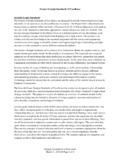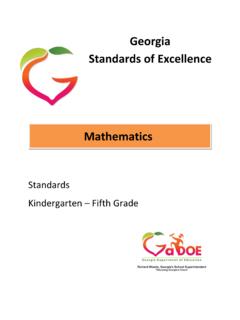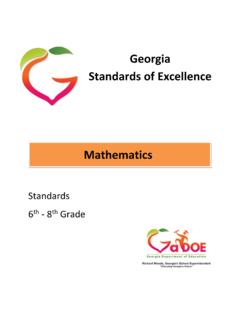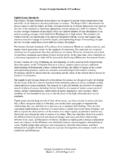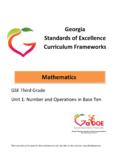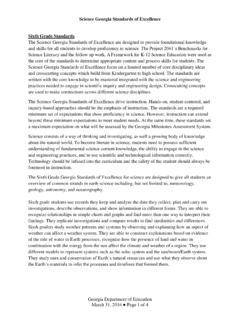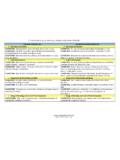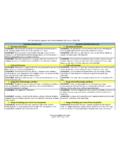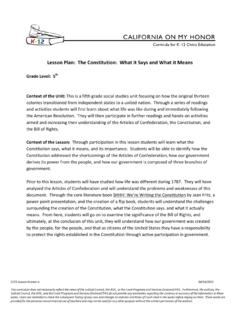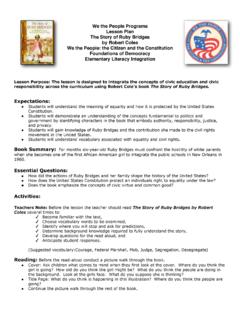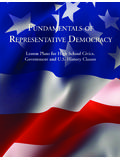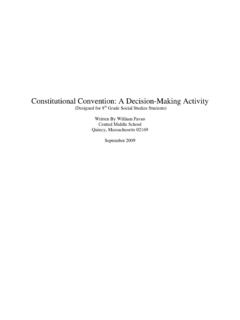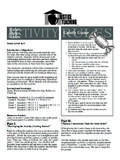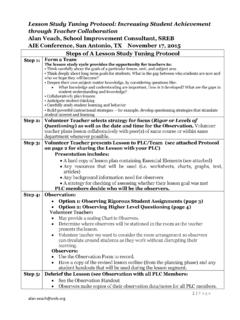Transcription of American Government/Civics - Georgia Standards
1 Social Studies Georgia Standards of Excellence American Government/Civics The government course provides students with a background in the philosophy, functions, and structure of the United States government . Students examine the philosophical foundations of the United States government and how that philosophy developed. Students also examine the structure and function of the United States government and its relationship to states and citizens. SSCG1 Compare and contrast various systems of government . a. Determine how governments differ in geographic distribution of power, particularly unitary, confederal, and federal types of government .
2 B. Determine how some forms of government differ in their level of citizen participation particularly authoritarian (autocracy and oligarchy) and democratic. c. Determine how the role of the executive differs in presidential and parliamentary systems of governments. d. Differentiate between a direct democracy, representative democracy, and/or a republic. SSCG2 Demonstrate knowledge of the political philosophies that shaped the development of United States constitutional government . a. Analyze key ideas of limited government and the rule of law as seen in the Magna Carta, the Petition of Right, and the English Bill of Rights.
3 B. Analyze the impact of the writings of Hobbes (Leviathan), Locke (Second Treatise on government ), Rousseau (The Social Contract), and Montesquieu (The Spirit of the Laws). on our concept of government . c. Analyze the ways in which the philosophies listed in element 2b influenced the Declaration of Independence. SSCG3 Demonstrate knowledge of the framing and structure of the United States Constitution. a. Analyze debates during the drafting of the Constitution, including the Three-Fifths Compromise, the Great Compromise, and the Commerce Clause.
4 B. Analyze how the Constitution addresses the weaknesses of the Articles of Confederation. c. Explain the fundamental principles of the United States Constitution, including limited government , the rule of law, federalism, separation of powers, checks and balances, and popular sovereignty. d. Explain the key ideas in the debate over ratification made by the Federalists and the Anti-Federalists. Georgia Department of Education June 9, 2016 Page 1 of 11. Social Studies Georgia Standards of Excellence SSCG4 Demonstrate knowledge of the organization and powers of the national government .
5 A. Describe the structure, powers, and limitations of the legislative, executive, and judicial branches, as described in the Constitution. b. Analyze the relationship between the three branches in a system of checks and balances and separation of powers. SSCG5 Demonstrate knowledge of the federal system of government described in the United States Constitution. a. Explain and analyze the relationship of state governments to the national government . b. Define and provide examples of enumerated, implied, concurrent, reserved, and denied powers.
6 C. Analyze the ongoing debate that focuses on the balance of power between state and national governments as it relates to current issues. d. Analyze the Supremacy Clause found in Article VI and the role of the Constitution as the supreme law of the land.. e. Describe the roles of Congress and the states in the formal process of amending the Constitution. SSCG6 Analyze the meaning and importance of each of the rights guaranteed under the Bill of Rights and how each is secured. SSCG7 Demonstrate knowledge of civil liberties and civil rights.
7 A. Define civil liberties as protections against government actions ( , First Amendment). b. Define civil rights as equal protections for all people ( , Civil Rights Act, Brown v. Board of Education, etc.). c. Analyze due process of law as expressed in the 5th and 14th amendments, as understood through the process of incorporation. d. Identify how amendments extend the right to vote. Georgia Department of Education June 9, 2016 Page 2 of 11. Social Studies Georgia Standards of Excellence SSCG8 Demonstrate knowledge of the legislative branch of government .
8 A. Cite the formal qualifications for representatives and senators listed in the Constitution. b. Describe the election process for representatives and senators and how the 17th Amendment impacted the election of senators. c. Compare the terms of office for each chamber of Congress and explain the Founders'. intent. d. Compare and contrast the powers of each chamber of Congress ( , power of the purse, 16th Amendment, treaties, etc.). e. Explain the steps in the legislative process. f. Explain the functions of various leadership positions and committees within the legislature.
9 G. Analyze the positive and negative role lobbyists play in the legislative process. SSCG9 Explain the impeachment and removal process and its use for federal officials as defined in the Constitution. SSCG10 Demonstrate knowledge of the executive branch of government . a. Cite the formal qualifications listed in the Constitution for President of the United States. b. Describe informal qualifications common to past presidents. c. Identify term of office and describe the line of succession ( , 20th, 22nd, and 25th amendments).
10 D. Analyze the role of the Electoral College in electing the President and the clarification provided in the 12th Amendment. e. Distinguish between the roles of the President, including Commander in Chief of the Armed Forces, chief executive, chief agenda setter, chief of state, chief diplomat, and party leader. SSCG11 Explain the functions of the departments and agencies of the federal bureaucracy. a. Compare and contrast the organization and responsibilities of independent regulatory agencies, government corporations, and executive agencies.
